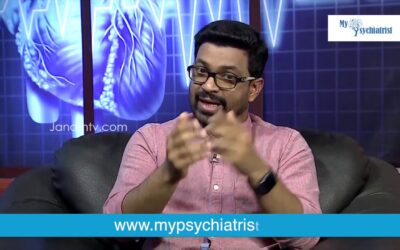Bipolar disorder, previously known as manic depression, is a mental disorder in which the person experiences distinct periods of depression and elevated mood.
The period of elevated mood is known as mania or hypomania, depending on its severity. During mania, the individual feels abnormally energetic and confident, and is distinctly happy, or irritable continuously for a period of more than one week. They often speak loudly, in a rapid manner and do not let others interrupt. They have short attention spans and their thoughts are often described as racing and they may change topics in the middle of a conversation. There may be high levels of creativity during this period. They appear active and involved in some goal directed activity. They make impulsive decisions without considering the consequences. The increased activity also reflects in inappropriate behaviours such as sexual advances and activities, and excessive spending. There may also be an abnormal increase in religiosity. The need for sleep is also reduced during the manic phase. In some cases, they may additionally have symptoms of psychosis (abnormal beliefs and experiences such as voices in the head, suspicion etc). An untreated episode of mania may last between 3 to 6 months.
During periods of depression, there is sadness, crying, a negative outlook on life, lethargy and lack of socialization .
In certain subtypes of Bipolar disorder, there may occur both manic and depressive symptoms during the same episode; irritability and agitation are often very prominent in such situations. Symptoms of psychosis as previously mentioned may also be seen. This type of presentation is called a mixed episode.
Bipolar Disorder affects roughly one out of every hundred and fifty individuals. Men and women are more or less equally affected. There is a high risk of suicide among those with Bipolar disorder, both during depressive and manic phases. The rates are higher during mixed episodes. The rates of self-harm are as high as 30 to 40% while suicides are around 6%.
The illness usually begins during late adolescence or early adulthood and runs an episodic course. Nine out of ten individuals with one episode of mania will have future episodes of depression or mania. The illness usually tends to be more severe if it begins at an earlier age.
Bipolar disorder is heritable and runs in families. Those with history of schizophrenia in the family are also at a higher risk of developing bipolar disorder as these two are related conditions. Research has shown that persons with bipolar disorder have abnormalities in the levels of certain brain chemicals, which are responsible for these symptoms. Environmental factors can often be identified as triggering an episode in these individuals. Major life events (such as deaths of loved ones, change of residence, occupation etc.), stress, and sleep disturbances are known to trigger episodes.
In order to make a diagnosis of bipolar disorder, in addition to interviewing the patient and caregiver, the doctor may need to examine the patient and ask for tests to rule out certain medical conditions such as thyroid abnormalities. If the illness begins at a later age, a brain scan may be needed to rule out any neurological problems.
Treatment commonly includes medications known as mood stabilizers. There medications, in addition to resetting the chemical imbalances in the brain, also prevent the occurrence of future episodes. Hence, they need to be continued for a longer period even after the symptoms subside. The medications for bipolar disorder should never be stopped without consulting your doctor as the stopping of these medications abruptly can trigger an episode. In addition to mood stabilizers, other medications including antidepressants, antipsychotics and sedatives may be also prescribed during the initial stages to control symptoms more quickly. Treatment in a hospital without the individual’s consent may be required if a person is at risk to themselves or others but refuses treatment. In certain cases, shock treatment or electroconvulsive therapy may also be used for treatment.
In addition to medications, you would also be advised on how to identify the onset of a future episode so that you can seek help as early as possible. You may also be provided information on how to regulate your activities including socialization and sleep to prevent triggering an episode owing to major imbalances in these areas.



0 Comments